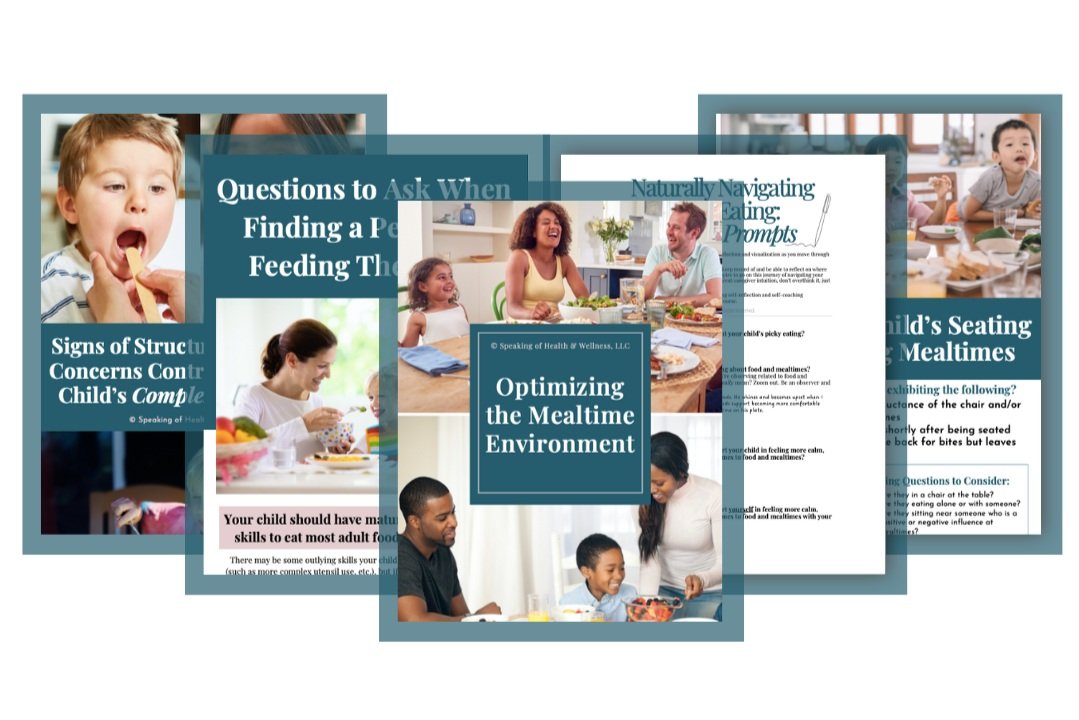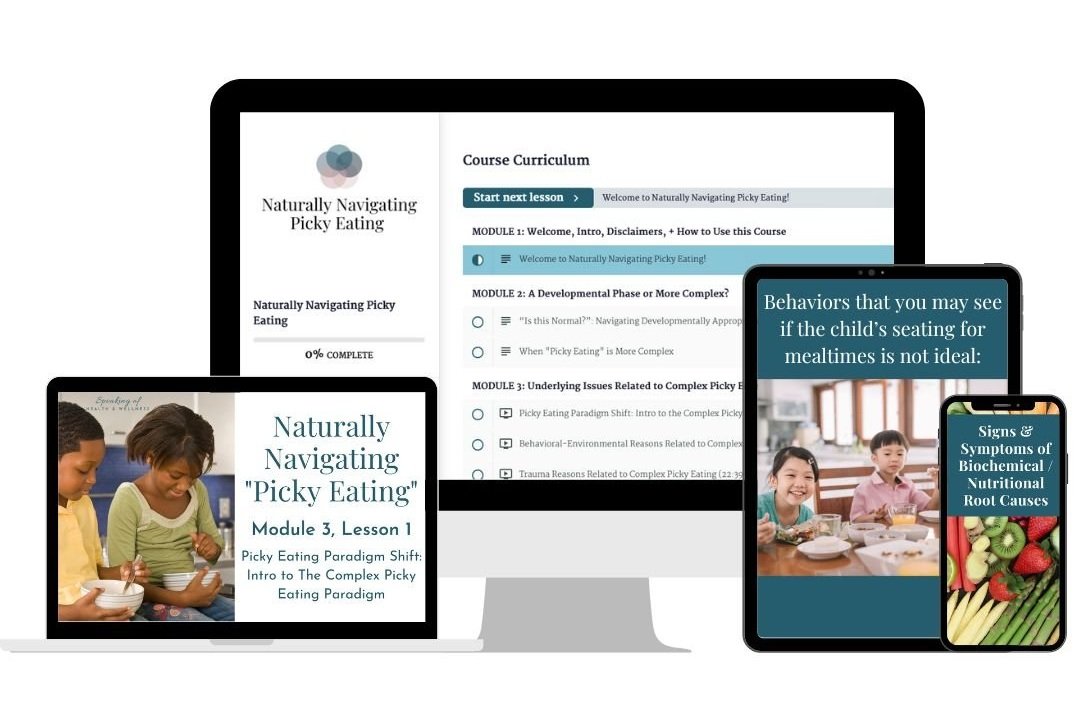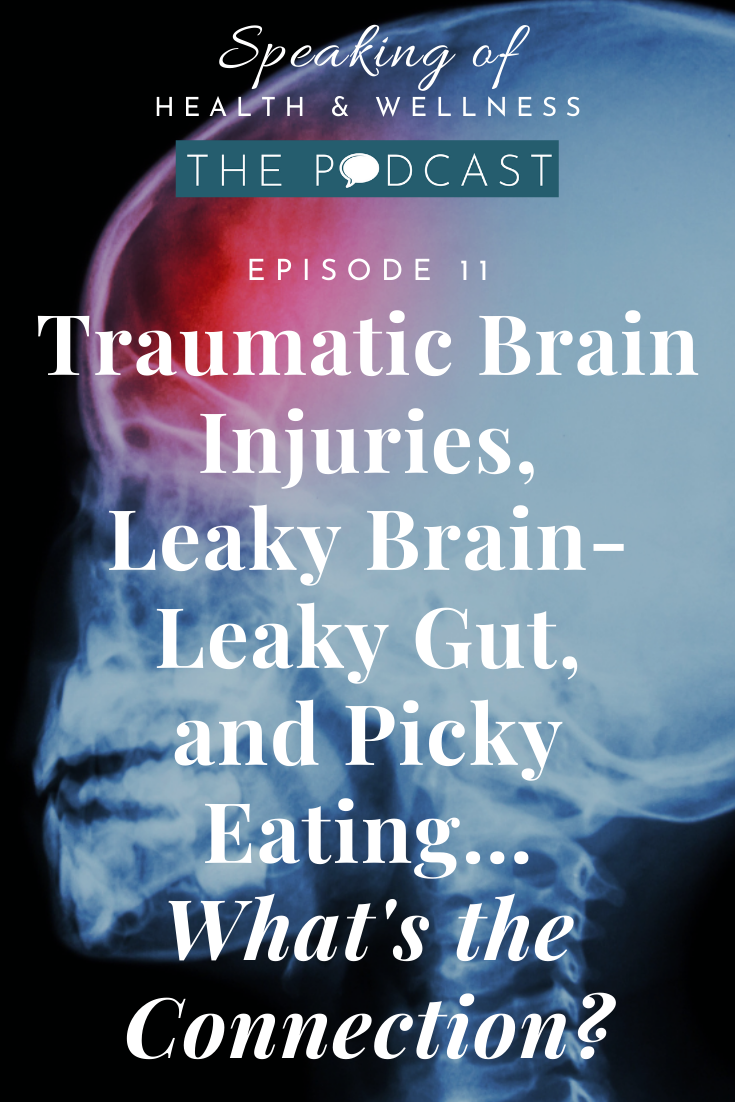Would you describe your child as a “picky eater”? Many parents of young children do!
How do you know when it’s developmentally appropriate vs. when is it a more complex issue to investigate and seek support? I’m here to help you understand this distinction and determine the answer for your child (and/or clients).
As an integrative Speech-Language Pathologist and pediatric feeding specialist, in addition to being a Functional Nutritional Therapy Practitioner and Documenting Hope Certified Health Coach, my passion is working with parents who are navigating complex picky eating and/or neurodevelopmental conditions (often overlapping but not always).
The term “picky eating” is so broad and often overused for kids who really do have a more complex issue, like a pediatric feeding disorder. Most pediatric and family health, wellness, and developmental providers are not properly trained to understand the full scope of “picky eating” (like knowing when it’s a real problem for families, how to help, and where to refer them based on the issue).
Let’s take a look at what’s considered developmentally appropriate vs. what would be considered a more complex issue…
Please note: The following lists of “picky eating” criteria were largely inspired by, and some contents were adapted directly from, S.O.S. Approach to Feeding, "Picky Eaters versus Problem Feeders", by Dr. Kay A. Toomey.
Developmentally Appropriate “Picky Eating”:
Child is within toddler to preschool age and…[see below]
Will eat at least 30 different foods
Eats at least one food from most food textures and/or nutrition groups
May really enjoy a certain food for a while then "burn out" on it, then re-introduce in a couple weeks
Is able to emotionally tolerate the sight of new foods on the table and on their plate most of the time
Will usually, sometimes hesitantly, touch or taste a new food
Typically eats with the family but not uncommon for them to sometimes have a different meal or different variations of the family meal
“Picky eating” seems to come and go (it’s not every single meal, every single day)
Sometimes reported as a "picky eater" to health providers
When I use the term complex picky eating, I’m referring to when a child's picky eating / self-restricted eating habits are not developmentally appropriate and are persistently & consistently causing quality of life issues for the child and/or family.
Some synonymous or sometimes co-occurring terms could also be: Pediatric Feeding Disorders, problem feeders, extreme picky eating, severe picky eating, etc.
Note: These terms listed above are not always exactly synonymous and/or co-occurring with what I’m describing as complex picky eating. Ex: There are some children who have Pediatric Feeding Disorders (PFD) who I would not consider complex picky eaters, but sometimes children with complex picky eating have a presence and/or history of a Pediatric Feeding Disorder.
Complex Picky Eating:
Child’s “picky eating” consistently creates a quality of life issue for the child and/or family (unpleasant mealtimes and feelings of stress, overwhelm, defeat, etc.)
If your child has a developmental delay(s), neurodevelopmental condition(s), or other special need(s) as well as the presence of “picky eating” that impacts your child and/or family’s quality of life
If your child has a diagnosed chronic health condition or the persistent unwanted chronic health symptoms as well as the presence of “picky eating” that impacts your child and/or family’s quality of life
Child is outside of those toddler to preschool age years and still has regular persistent “picky eating” tendencies
If in toddler to preschool years and...[see below]
Typically self-limited down to eating less than 20 different foods
May really love a food, eat it often and consistently, then seems to "burn out" on it
For these kids, foods that become "food jags" are generally not easily reintroduced once they’re lost or “burnt out” on them (at least not for a long, long, time)
Child has a very difficult time emotionally tolerating the sight of new and/or unpreferred foods on their plate
May whine, cry, protest, push away plate, take the new or unpreferred food off right away, etc. Full refusal of the new or unpreferred food(s)
Child's reaction to new or unpreferred foods causes an emotional disruption in the mealtime
Refuses certain food textures or nutritional groups entirely
Almost always eats a different meal than the rest of the family and often doesn't eat with the family during mealtimes (sometimes because the family’s food bothers the child)
Consistently reported as a "picky eater" to health providers
Pediatric Feeding Disorder:
Pediatric Feeding Disorder is the official diagnostic term that some of the children with what I’m often referring to as complex picky eating could potentially qualify for. Typically I choose to use “complex picky eating” more often in my content because it’s more “parent friendly” / what parents are internet searching, at least initially.
It is estimated that 1 in 37 children in the United States under the age of 5 has a Pediatric Feeding Disorder.
According to Manikam & Perman (2000), “Pediatric feeding disorders are common: 25% of children are reported to present with some form of feeding disorder. This number increases to 80% in developmentally delayed children. Consequences of feeding disorders can be severe, including growth failure, susceptibility to chronic illness, and even death. Feeding disorders occur in children who are healthy, who have gastrointestinal disorders, and in those with special needs.”
Raising awareness and identification are the first steps!
I hope that this information helps clarify what is developmentally appropriate vs. what’s a more complex picky eating issue.
I encourage you to explore the contents of the site further and/or listen in to Speaking of Health & Wellness: The Podcast where I dive much deeper into this topic and give action steps that you can use at home! You can find the podcast here on the site and on major podcast platforms.
This podcast episode pairs well with this blog:

























